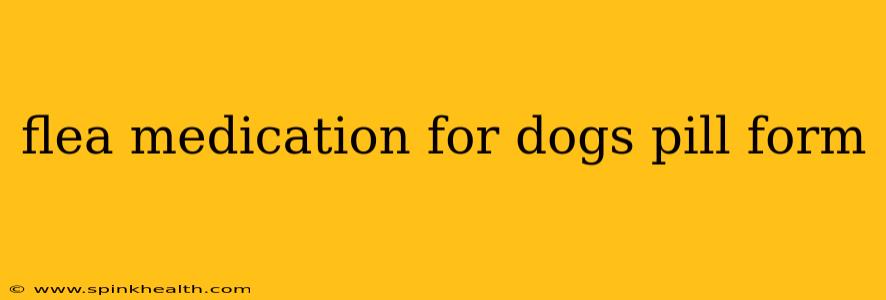For years, the battle against fleas has been waged with topical treatments, collars, and sprays. But a powerful new weapon has emerged in the fight: flea medication for dogs in pill form. This isn't your grandma's flea powder; oral medications offer a convenient and often highly effective solution, changing the game for pet owners everywhere. Let's delve into the world of oral flea control, exploring its benefits, potential drawbacks, and answering the burning questions you might have.
My name is Dr. Emily Carter, and I've been a veterinary practitioner for 15 years, witnessing firsthand the evolution of flea control. I've seen the struggles of pet owners dealing with persistent infestations and the relief provided by effective treatments. This post is based on my experience and extensive research, aiming to provide you with the most comprehensive information possible.
What are the advantages of flea pills for dogs?
Imagine a world without the messy application of topical treatments, the potential skin irritations, or the constant worry about your dog rubbing off the medication. Oral flea medication offers a simplicity that's hard to match. One pill, once a month (or as directed by your vet), and you're done! This convenience is a huge draw for busy pet owners. Beyond the ease of use, many oral medications tackle fleas at the source – stopping the flea life cycle before it even begins. This proactive approach leads to more effective flea control.
What are the different types of oral flea medication for dogs?
The market offers a variety of oral medications, each with its own active ingredient and mechanism of action. Some target adult fleas, while others interrupt the lifecycle by preventing flea eggs from hatching or larvae from developing into adults. Your vet will help determine the best option for your dog based on their size, age, health conditions, and the severity of the flea infestation. Remember, never self-medicate your pet; always consult your veterinarian.
Are there any side effects of oral flea medication for dogs?
Like any medication, oral flea pills can have side effects. These can range from mild (such as vomiting or loss of appetite) to more severe reactions (though rare). Your vet will discuss the potential side effects of any medication they prescribe and advise you on what to watch for. Early detection of any adverse reaction is crucial for prompt intervention.
How often should I give my dog flea pills?
The frequency of administration varies depending on the specific medication prescribed by your veterinarian. Some medications are given monthly, while others may require a different schedule. Following your vet's instructions meticulously is paramount to ensuring the effectiveness and safety of the treatment. Never deviate from the recommended dosage or frequency.
How effective are oral flea medications compared to topical treatments?
Oral and topical treatments each offer unique advantages. Oral medications often provide broader protection, targeting different stages of the flea lifecycle. Topical treatments, while convenient for application, might not be as effective against a severe infestation. The best choice depends on your dog’s individual needs and the severity of the flea problem. Your vet can help you weigh the pros and cons of each approach.
Can I give my dog human flea medication?
Absolutely not. Human flea medications are formulated for human physiology and can be extremely toxic to dogs. Never attempt to treat your dog with human medications. Always consult your veterinarian for safe and effective flea control solutions specifically designed for canine use.
What if my dog has a severe flea infestation?
If your dog is suffering from a severe flea infestation, don't hesitate to consult your veterinarian immediately. They can help diagnose the problem, recommend the most appropriate treatment plan (which may involve a combination of oral medications and other treatments), and address any underlying health concerns that might be exacerbated by the infestation.
Oral flea medication offers a significant advancement in canine flea control, providing convenience and effectiveness. However, remember that responsible pet ownership includes consulting with your veterinarian to ensure the safety and efficacy of any medication you administer to your furry friend. Choosing the right medication and following your vet's instructions diligently is key to keeping your dog happy, healthy, and flea-free.

